
Avengers of the VT-6 Enterprise Air Group flying from the USS Intrepid in 1944. (U.S. Navy Museum of Naval Aviation)
Ninety minutes before daybreak on February 17, 1944, Operation Hailstone was launched from three U.S. aircraft carrier groups in the South Pacific. Hundreds of American warplanes ravaged the Japanese-held island airfields and harbors of Truk Lagoon, one of the most formidable Japanese naval air bases in the Pacific.
Truk Lagoon is a protected body of water in the South Pacific, and the final resting place of many WW II wrecks, including 12 small warships, 32 merchant ships, and 275 aircraft. Here, the tail section from an SBD-5 Dauntless dive bomber rests on the ocean floor. (Photo by Bob Hess/Scripps) Below: The iconic punched holes of the split-panel dive brakes from an SBD-5 Dauntless dive bomber are visible resting on the floor of the lagoon near the main debris site. Right: The coral-covered propeller of an SBD-5 Dauntless dive bomber stands above the sand in Truk Lagoon.
The low-flying torpedo bombers and dive bombers did not show up on Japanese radar, and so were a complete surprise to the Japanese forces, with many of their personnel on shore leave. Over the next two days, Operation Hailstone stormed the Japanese defenses, shot down anddestroyed more than 250 warplanes, and sank nearly 50 Japanese merchant vessels in addition to the few fighting ships that were left. An important victory for the United States, Operation Hailstone also resulted in the loss of 30 U.S. aircraft and 23 missing aviators and crew members.
U.S. Avengers, Hellcats, and SBD Dauntless aircraft aboard the USS Intrepid, 1944. (U.S. Navy Museum of Naval Aviation)
Bu hikaye Flight Journal dergisinin June 2020 sayısından alınmıştır.
Start your 7-day Magzter GOLD free trial to access thousands of curated premium stories, and 9,000+ magazines and newspapers.
Already a subscriber ? Giriş Yap
Bu hikaye Flight Journal dergisinin June 2020 sayısından alınmıştır.
Start your 7-day Magzter GOLD free trial to access thousands of curated premium stories, and 9,000+ magazines and newspapers.
Already a subscriber? Giriş Yap

Keeping 'em Flying!- The new generation of warbird pilots, restorers and mechanics
The new generation of warbird pilots, restorers and mechanics. Nearly 80 years after the end of World War II, the fighters, bombers, and trainers that defended freedom continue to enthrall and inspire audiences at airshows, thanks to generations of warbird pilots, maintainers, restoration specialists and collectors. In our September, 2022 issue we introduced you to the young warbird pilots, maintainers and restorers who are already beginning to displace more "experienced" warbird fliers and fixers.

The Corsair Maker- Bringing the Vought Corsair to the fleet was a daunting challenge that spanned nearly three years.
When the first production Corsairs exited the Stratford factory in June 1942, Guyton, as seen here, was tapped to manage the flight and production test program. Armament was improved to six wing-mounted .50s, displacing the wing fuel tanks now placed forward of the cockpit which necessarily was moved rearward by 32 inches. Overall length was increased, armor plate added, landing, arresting and tail gear improved, aileron control enhanced, and a new version of the R2800 engine was incorporated. But those significant improvements unearthed numerous idiosyncrasies that would take an extended period to make the Corsair acceptable for carrier operations
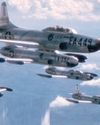
STARFIRES Over Korea
F-94 pilots tangle with MiGs
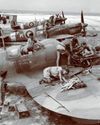
Training Mission
BY THE TIME THIS TRAINING SCENE WAS RECORDED in Canne, Italy, in July 1944, Allied Yugoslavian airmen had several years of experience working side by side with the RAF.
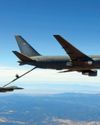
KC-46A PEGASUS
Next generation aerial refueler
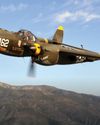
"SATAN'S ANGELS" ACE - Tales from a P-38 pilot in the South Pacific
\"AS A KID GROWING UP on the bow of my father's tugboat, hauling oil from Seattle to Alaska, I had a lot of time on my hands.
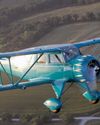
WACO YKC - Stunning and Ultra Rare Golden Age Cabin Flier
BETWEEN THE IMPLEMENTATION of the Air Commerce Act of 1926 and December 31, 1948, all U.S. registered flying machines sported an N-number, much as they do today, the \"N\" being an internationally recognized identifier for the United States. During that period, however, an additional letter-identifier followed the \"N.\" Depending on their category, they were registered in the NC (Commercial), NG (Glider), NL (Limited), NR (Restricted, usually meaning race airplanes), NS (State government), and, finally, NX (experimental).
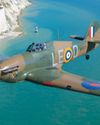
BADER'S HURRICANES
Double amputee fighter ace Douglas Bader and his Battle of Britain Hurricanes
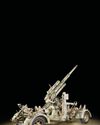
Scourge of the Allied Fighters
IT HAD TO BE THE MOST HELPLESS FEELING in the world: you're at 25,000 feet over Europe knowing that your primary function is to drop bombs-or flying escort for the bombers while being a slow-moving target for some of the world's finest shooters. However, you have John Browning's marvelous .50 caliber invention to give some degree of protection. Unfortunately, you're absolutely helpless against flak. Piloting and gunnery skills play no role in a game where sheer chance makes life and death decisions. For that reason, the Krupp 88 mm Flak 18/36/37 AA cannon could be considered WW II's ultimate stealth fighter. You never saw it coming.
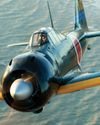
ZERO MYTH, MYSTERY, AND FACT
A test pilot compares the A6M5 Zero to U.S. fighters